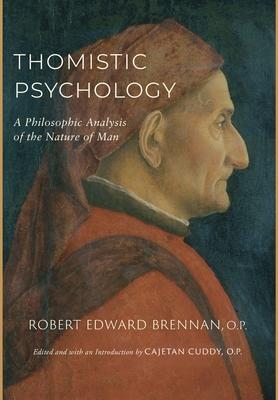When one lists the influential figures who gave shape to the modern psychological disciplines, a thirteenth-century philosopher and theologian does not immediately come to mind. After all, what illuminative value could the philosophical treatises of St. Thomas Aquinas claim for the case studies of Sigmund Freud, for example?
In Thomistic Psychology, Robert Edward Brennan, O.P., explains how philosophical principles influence psychological practice and inquiry. Although Thomistic Psychology first appeared over seventy-five years ago, its methodology and analysis remain relevant. Any student of psychology and philosophy will find the argument Father Brennan advances in these pages enlightening and thought-provoking. In an age characterized by disputes about human life, personhood, and identity, clear thinking about human nature could not be more important. This book deserves careful attention because its subject--the truth about what it means to be human--remains an essential part of the human experience.
